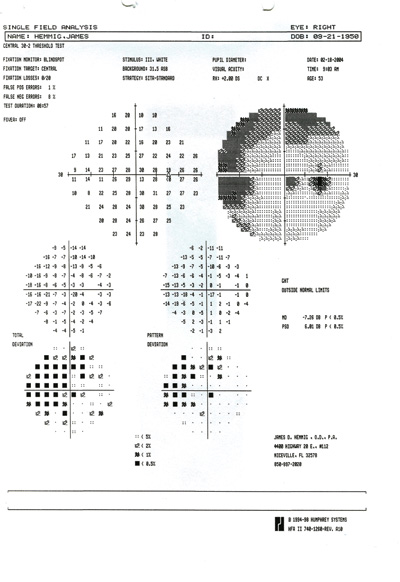An optometrist in Florida successfully sued an ophthalmologist for medical malpractice.
Ophthalmologist Samuel Poppell, of Ft. Walton Beach, diagnosed optometrist James Hemmig, of Niceville, with dry eye syndrome. But Dr. Hemmig later found out that he really had advanced open-angle glaucoma.
In January, the suit was settled for an undisclosed amount. This malpractice case may be the first of its kind between an optometrist and an ophthalmologist.
How it began: In March 2000, Dr. Hemmig visited Dr. Poppell complaining of cloudy vision in his right eye that was like looking through a nylon stocking. Dr. Hemmig claimed in the lawsuit that Dr. Poppell didnt perform a visual field or dilated fundus exam and didnt measure intraocular pressure. Nor did Dr. Poppell investigate the cause of Dr. Hemmigs decreased visual acuity. Instead, Dr. Poppell diagnosed dry eye and performed three thermal cauteries to occlude the puncta, which didnt succeed and didnt improve his vision.
 |
| A visual field test of Dr. Hemmigs right eye shows advanced glaucomatous field loss with central scotoma. |
In November 2000, I was sitting at my office desk wondering what would cause the constant haze, and then it hit my like a brick, Dr. Hemmig says. High IOP causes corneal haze. He asked his technician to perform non-contact tonometry and found the IOP measured 48mm Hg in his right eye. Dr. Hemmig visited a fellow optometrist who confirmed his high IOP and also observed dense corneal clouding. Timolol lowered his IOP to 20mm Hg and cleared the edema.
Dr. Hemmig visited a glaucoma specialist who diagnosed pigmentary glaucoma. Visual fields demonstrated advanced glaucomatous field loss with central scotoma splitting the visual axis. His central stereopsis was lost. Maximum medical therapy and even laser treatment failed to control his IOP, and the glaucoma specialist eventually performed trabeculectomy. In addition, Dr. Hemmig underwent two phototherapeutic keratectomies to treat corneal distortion.
In responding to the suit, Dr. Poppell asserted that Dr. Hemmig had refused visual fields and other tests. Further, Dr. Poppell claimed Dr. Hemmig told him that he was taking his own IOP measurements and was also under the care of another doctor. A review of Dr. Hemmigs patient record found no notations to support Dr. Poppells claims.
The corneal specialists professional opinion: Dr. Hemmig is permanently disabled due to his condition and unable to perform his job as he did before. I live off my disability check and see enough patients to cover my overhead, Dr. Hemmig says.
His advice: When your diagnosis is no longer consistent with the findings, investigate other possibilities and do the tests required, he says. At his last visit to Dr. Poppell, before he discovered his high IOP, Dr. Hemmig asked the ophthalmologist why he couldnt see. He never answered the question and that is what set off the warning lights in my head.

